Ghost the California Octopus Wins Hearts as She Devotes Her Final Days to Her Eggs
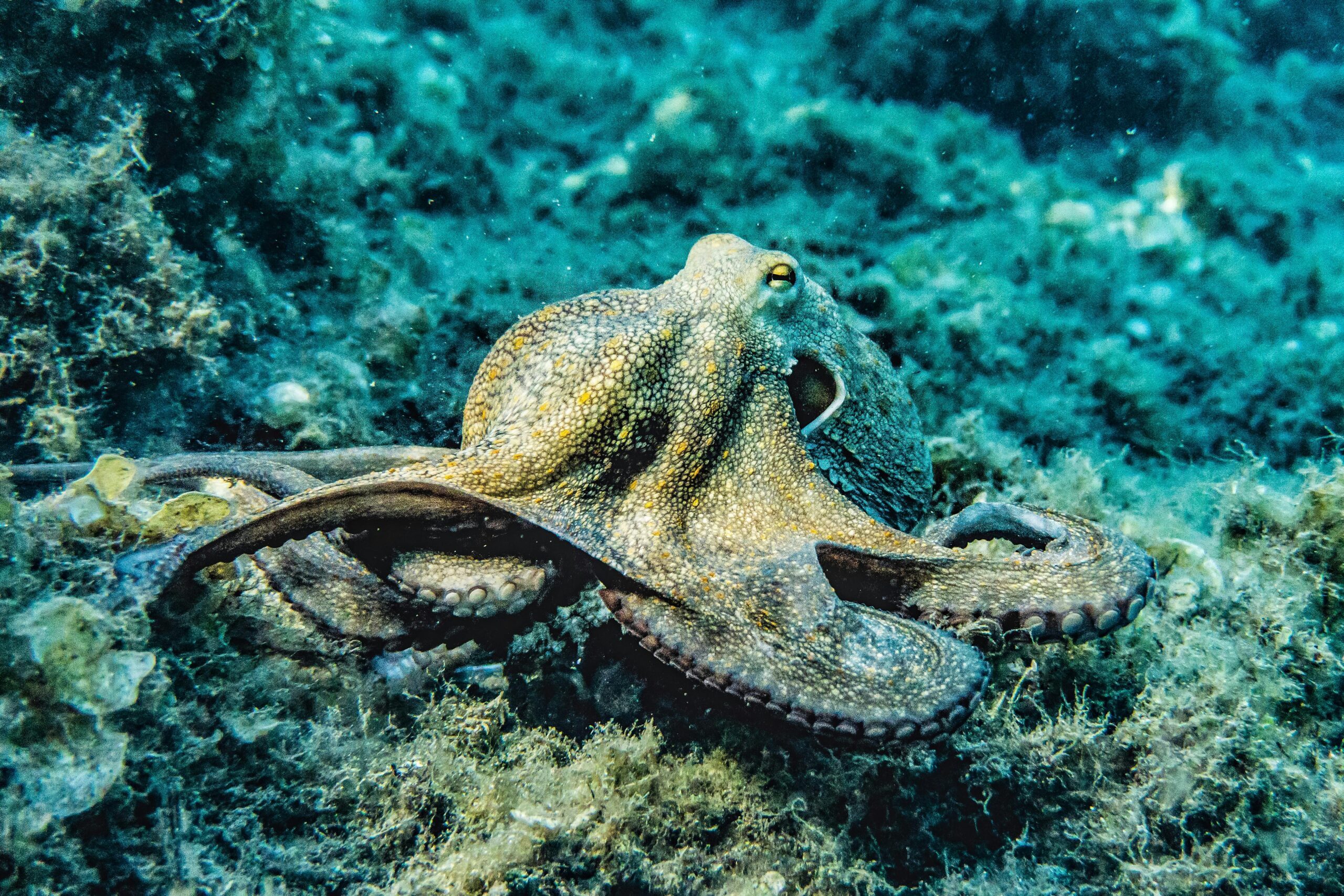
Inside a quiet corner of the Aquarium of the Pacific in Long Beach, California, a story is unfolding that has captivated hearts far beyond the glass of her tank. Ghost, a giant Pacific octopus whose personality has been described as mischievous, intelligent, and deeply charismatic, is nearing the end of her life. Her once playful energy has now been poured into a single, unwavering task: tending to thousands of eggs that, tragically, will never hatch. This maternal devotion is not a sign of weakness or sadness, but rather the culmination of her species’ natural life cycle, known as senescence. And yet, to those who have loved her from afar whether through visits to the aquarium or by following her online journey it feels achingly bittersweet.
What makes Ghost’s story resonate is not only the inevitability of her passing, but the way she has transcended her tank, becoming something more than just a marine exhibit. She has become a symbol of resilience, care, and the strange, wondrous connections that can form between humans and creatures from the depths of the ocean. Her fans wear sweaters embroidered with her likeness, ink tattoos in her memory, and flood social media with farewell messages. Ghost has become living proof that even animals whose lives appear alien to ours can stir emotions of love, admiration, and reflection. Her final act, though biologically destined, has unfolded like a parable about life’s fragility and devotion reminding us all how profoundly nature can move us.
Ghost’s Journey From the Wild to Aquarium Fame
Ghost’s story began not in the bustling city of Long Beach, but in the cold, turbulent waters of British Columbia, Canada. It was here that she was carefully collected by scientific specialists in 2024, a young octopus weighing barely three pounds. At the time, she was no larger than a household cat, far from the fifty-pound marvel she would later become. Her arrival at the Aquarium of the Pacific was the beginning of a life that would soon captivate thousands of visitors and countless more online.
As she grew, so too did her reputation. Ghost was far from a timid cephalopod she was curious, playful, and startlingly intelligent. Caretakers recall her shoving aside food not because she wasn’t hungry, but because she wanted to interact with them instead.
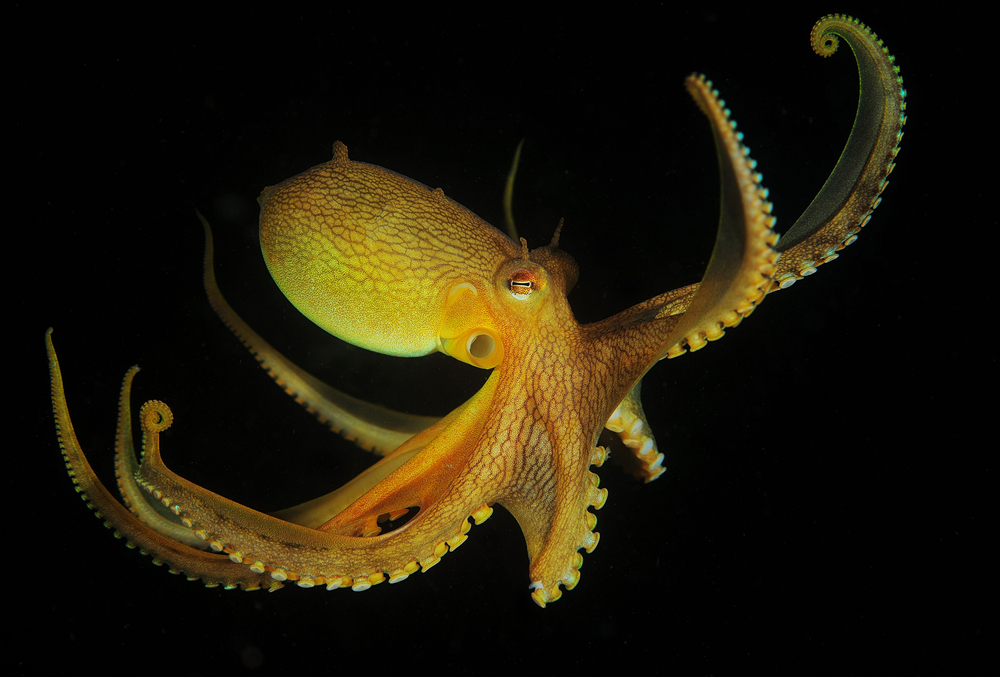
She learned to crawl voluntarily into a basket for weigh-ins, solved puzzles and mazes in minutes, and displayed the kind of cognitive abilities that scientists often compare to those of primates. Her antics quickly became part of the aquarium’s lore: the octopus who solved an intricate acrylic maze almost instantly after staff had spent hours designing it, or the one who seemed to play games with her caretakers rather than merely feeding.
For aquarium visitors, Ghost shattered the stereotype of the octopus as a solitary, unknowable creature. She was outgoing, engaging, and seemed to enjoy human presence an unusual trait in a species that typically lives alone in the wild. In this way, she wasn’t just a specimen on display but an ambassador for her kind, showing the public how remarkable octopuses truly are. That bond, carefully nurtured through enrichment activities and trust-building, laid the groundwork for why her story now tugs so insistently at human hearts.
The Poignant Cycle of Senescence
A dying octopus named Ghost at the Aquarium of the Pacific is receiving an outflowing of love from fans as she spends her final days pouring her last energy into caring for her eggs – even though they will never hatch.
— ABC7 Eyewitness News (@ABC7) September 13, 2025
"She is a wonderful octopus and has made an eight-armed… pic.twitter.com/E0kSyuWJiP
Yet even for a creature as extraordinary as Ghost, biology remains inescapable. In early September 2025, the aquarium announced that she had entered senescence, the final chapter in the life of a female octopus. For the giant Pacific octopus, this phase begins when a female lays her clutch of eggs. From that moment on, her life becomes singularly focused on their protection. She guards them day and night, ensuring fresh water circulates around them, cleaning them with her arms, and defending them against potential threats. The cost of this devotion is steep: she neglects eating, her body weakens, and she slowly wastes away.
In Ghost’s case, the tragedy deepens. Her eggs are unfertilized. They will never hatch, yet her instincts compel her to protect them with absolute determination. To human eyes, the sight of a mother giving everything to offspring doomed never to live may appear unbearably sad. But in evolutionary terms, it is the final act of her species’ natural rhythm a drive so deeply etched into her biology that no circumstance can alter it. In the wild, this maternal sacrifice ensures at least a few of the thousands of hatchlings have a chance at survival. In the aquarium, Ghost’s story has become something different: a reflection on love and sacrifice, even when the outcome is futile.
This stage of life is not painless. Octopuses in senescence often show signs of physical decline lesions, uncoordinated movement, retraction of skin around the eyes. Their once-vivid color patterns dull. Ghost has been moved to a quieter tank, away from the crowds, where she can live out her remaining days in peace. Her caretakers describe her as “resting comfortably,” though the inevitability of her decline looms. To those who cared for her daily, it is a bittersweet vigil: honoring her instincts while preparing to say goodbye.
The Viral Sensation That Touched the World
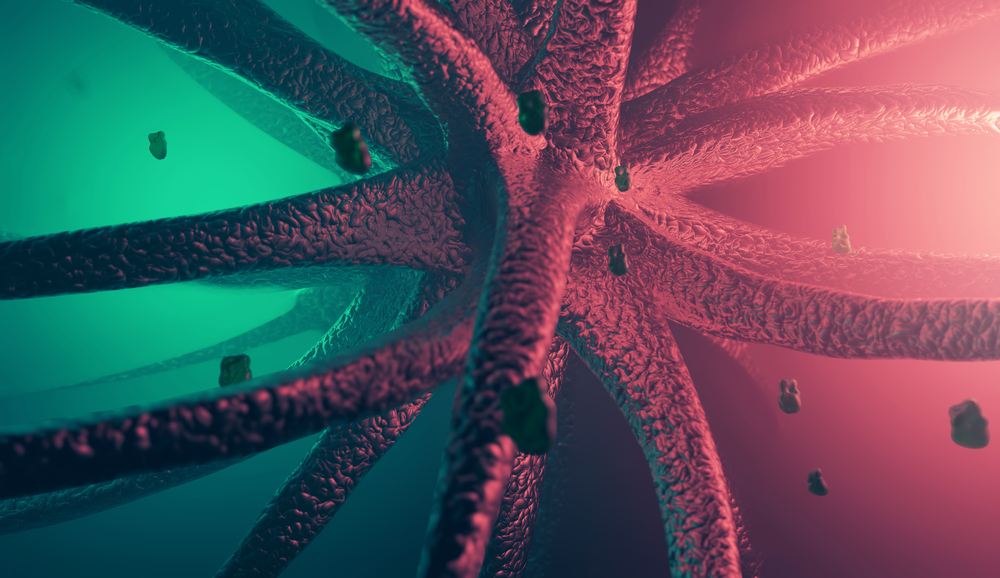
Even before her final days, Ghost had become something of an internet phenomenon. Videos of her clever antics from solving puzzles to gently interacting with her caretakers spread widely on social media. Fans delighted in her intelligence and charm, and the aquarium’s updates about her life regularly drew waves of engagement. By the time the announcement of her senescence was made, Ghost had a devoted following, one that has only grown as her story turned poignant.
Visitors to the aquarium, aware that she has been moved behind the scenes, still leave messages of farewell and gratitude. On Instagram, the Aquarium of the Pacific shared: “She is a wonderful octopus and has made an eight-armed impression on all of our hearts.” The public response was overwhelming. Some visitors reflected on the moments they had shared with her during earlier visits; others shared photographs of tattoos or sweaters created in her honor. Ghost had ceased to be only an octopus in a tank she had become a cultural figure, a creature that symbolized the deep bonds humans can feel for non-human lives.
The reach of her story is proof of how animals can unite people in empathy. She wasn’t a celebrity in the usual sense, yet she became one. Ghost’s fans include families who saw her as part of their children’s education, marine biology students inspired by her intelligence, and casual aquarium visitors who were unexpectedly moved by her presence. In a world where headlines often dwell on conflict and division, Ghost’s tale brought people together in a shared sense of awe and tenderness.
Ghost’s Extraordinary Intelligence and Bond with Humans
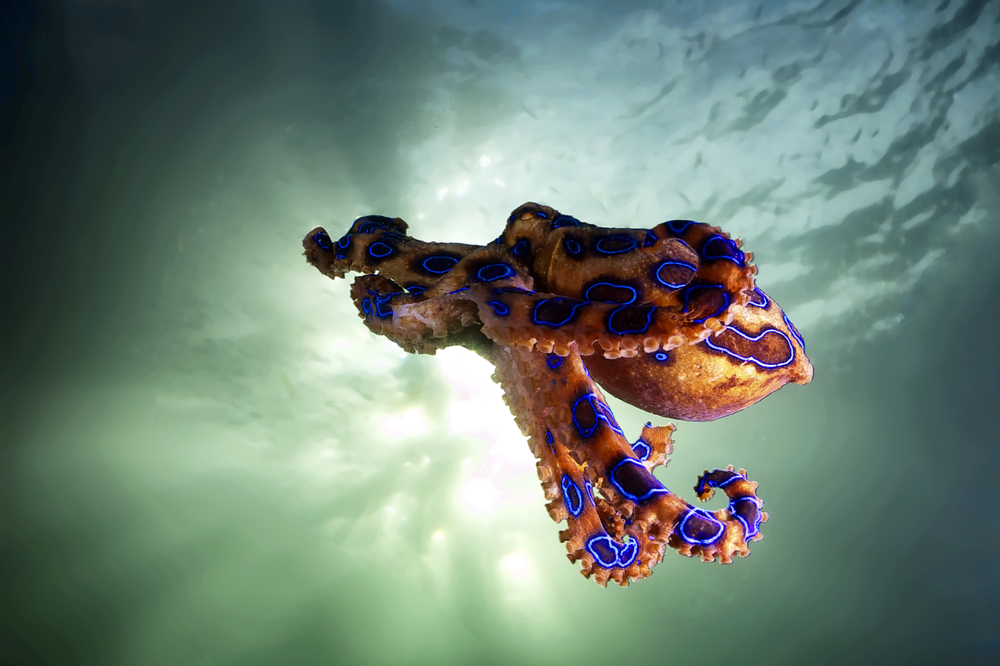
What made Ghost so magnetic wasn’t only her story of decline, but also the brilliance of the life she had lived. Octopuses are renowned for their intelligence, often compared to primates in their problem-solving and curiosity. Ghost embodied these qualities with startling clarity. Her ability to unscrew jars, manipulate puzzle boxes, and navigate mazes astonished even seasoned caretakers. More than once, she displayed behavior that hinted at preference and playfulness nudging away food to prolong interactions or choosing to engage with staff in ways that suggested more than simple instinct.
Caretakers recall her willingness to build trust, voluntarily entering baskets for health checks and responding to daily enrichment activities with enthusiasm. This was not mere training; it was communication between two species separated by more than 600 million years of evolution. The fact that Ghost bridged that gap so effectively speaks volumes about both her intelligence and her individuality.
Visitors often remarked on how social she seemed, contrasting with the solitary nature of most octopuses in the wild. For those who had the privilege of watching her, it felt like peering into a mind both alien and strangely familiar. She reminded us that intelligence takes many forms, and that our assumptions about the hierarchy of creatures can be upended by the flick of an octopus’s arm.
Honoring Ghost’s Legacy
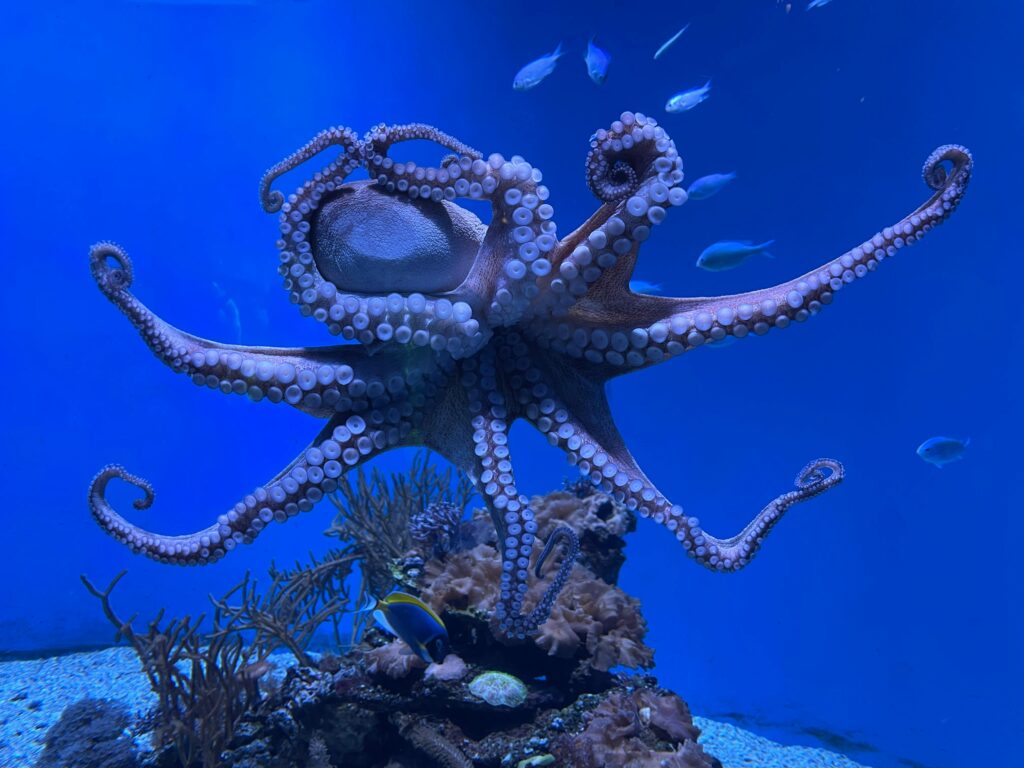
The Aquarium of the Pacific has made clear that Ghost’s passing will not mark the end of her impact. When her time comes, she will undergo a necropsy, the animal equivalent of an autopsy, to provide valuable scientific insights into her health and care. Her remains will then be cremated. But her story will continue in other ways. The aquarium has announced plans to collaborate with an artist to create prints in her honor and has already welcomed a new octopus, a young two-pound cephalopod who will eventually take up residence in her habitat. This newcomer, curious and outgoing, will continue Ghost’s role as ambassador, but Ghost herself can never be replaced.
The legacy she leaves is not only scientific but emotional. She has inspired countless people to learn more about marine life, to care about the fragile ecosystems of the ocean, and to see intelligence in places they might not have expected. For some, she symbolizes maternal devotion, giving everything to a cause despite its futility. For others, she is a reminder of resilience, a creature who engaged with the world until biology wrote its final chapter. In every case, she has changed the way people see the natural world.
Ghost’s story also underscores the role aquariums can play in education and conservation. While debates around captivity continue, her life demonstrates the potential of ethical care and human-animal connection to inspire awe and respect for marine ecosystems. The Aquarium of the Pacific has emphasized how stories like Ghost’s draw attention to conservation efforts that extend far beyond the walls of the facility. Supporting such spaces, they argue, is one way to preserve the wild places where octopuses and other marine creatures still thrive.
A Lasting Impression Beyond the Tank
As Ghost lives out her final days in quiet devotion to her eggs, the world continues to reflect on the impact she has made. Her story is a reminder that life’s most powerful lessons often come from unexpected sources. She has taught us about the beauty of sacrifice, the intelligence of creatures who share no close kinship with us, and the strange ways in which connection can blossom across species. Her legacy has been immortalized in tattoos, in sweaters, in online tributes but more importantly, in the hearts of those who will never forget her.
Ghost’s eggs will never hatch, but in another sense, they already have. They have given rise to conversations about conservation, to renewed fascination with marine life, and to a shared memory that binds together people across the world. In her final act, Ghost has done what few humans ever achieve: she has left a mark that will endure long after her body fades.
Her journey began in the cold seas of British Columbia, passed through the bright lights of Long Beach, and now rests in a quiet corner where she fulfills the last chapter of her existence. Her life, brief but brilliant, is closing not in silence but in resonance. The eight-armed impression she has left behind will linger in the aquarium, in the hearts of her fans, and in the larger story of our relationship with the natural world. Ghost may be fading, but the wonder she inspired will ripple outward endlessly, like waves across the Pacific she once called home.
Loading...

